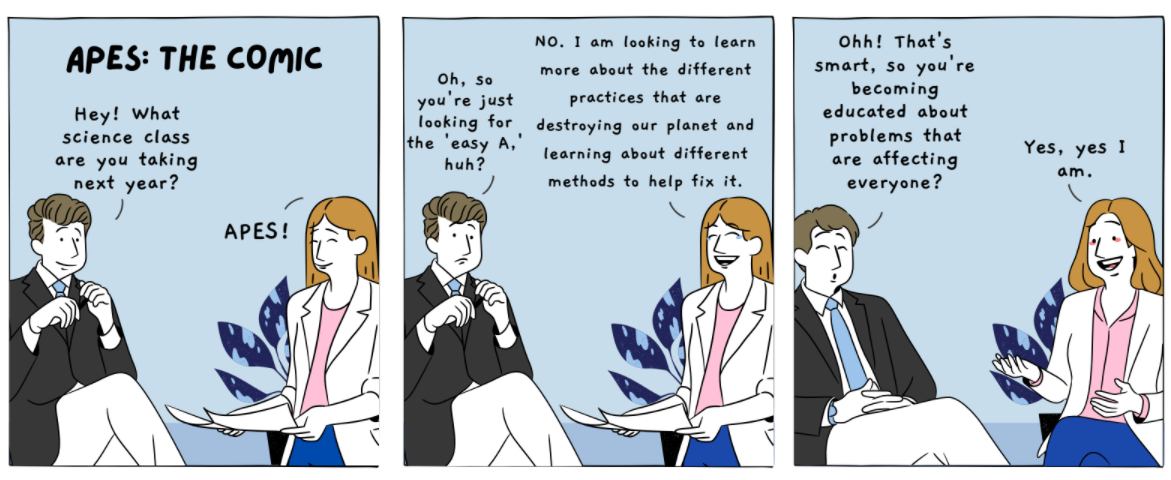APES: the most important science class to take in high school
Stigma surrounding the course is unwarranted, problematic
I saw a TikTok that went viral in the beginning of this school year that made a joke about AP Environmental Science. The video poked fun at the class by saying APES students’ homework is to draw a polar bear. The video, while hilarious, is far from the truth. If you like drawing, I am sorry to disappoint you. I was never assigned to draw a polar bear. I was instead busy learning about the harmful practices the U.S. spends its money on that will destroy the planet we all call home.
The stigma against APES within HHS needs to change immediately. After taking the class this past year, I can attest that the class is the most valuable science course for students to take in high school.
Around school, APES is commonly referred to as the “easy AP” and is often regarded as the least valuable science class offered. However, having taken the class, I feel confident in saying that one, the class is not an “easy A” and requires dedication and time spent on reading. And two, the content taught in the class is extraordinarily relevant to modern times.

I admit, when signing up for the course I thought the content would primarily surround climate change. I was wrong. While climate change is covered extensively, I was exposed to topics such as the problematic meat and fish industry, soil erosion, weather patterns, marine and terrestrial ecosystems and energy sources –– to name a few.
While the basics of mitosis and meiosis are nice to know, the actions we, as humans, are doing to ruin the world we live in is –– in my eyes –– much more vital. After all, we are the future. If we, the next generation, are not informed about the sources of our problems and are not exposed to new methods to combat these issues, nobody will be aware of how to save the human population from our own destruction.
Especially now, as climate change has come to the forefront of international political discussions, I am glad that my eyes have been opened to the many layered and complex issues our world faces. I am now able to hold a conversation with anyone surrounding countless different topics and practices. Topics that without APES, I otherwise would have no knowledge of, but are critically impacting our lives today.
Even if you personally do not want to go into a career in environmental science, the curriculum taught in APES is a necessity, since the environmental problems we currently face are worldwide issues that affect everyone. After all, changes and policies are not created and passed solely by people in the industries –– it must be a group effort.
It is nice that America is starting to open its eyes to the damaging effects of our practices through the Biden administration, but it is not enough. New generations must be knowledgeable on the many ways humans have destroyed our world and must begin to gain knowledge on ways to prevent, fix, and come up with policies pertaining to alternative energy sources, forestry and agriculture practices, meat and fish production and much more. The first step we can take is taking APES.
I implore students to give APES the recognition it deserves and allow themselves to become immersed in the essential knowledge that can save our planet. If the class is an easy A (which I caution is not entirely true), well that’s great; students can earn high marks for learning about our world and ways to fix it. That is just one, out of the many, added benefits from taking the class.











